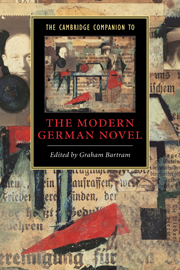Book contents
- Frontmatter
- 1 The German novel in the long twentieth century
- 2 Contexts of the novel
- 3 The novel in Wilhelmine Germany
- 4 Gender anxiety and the shaping of the self in some modernist writers
- 5 Franz Kafka
- 6 Modernism and the Bildungsroman
- 7 Apocalypse and utopia in the Austrian novel of the 1930s
- 8 Images of the city
- 9 Women writers in the ‘Golden’ Twenties
- 10 The First World War and its aftermath in the German novel
- 11 The German novel during the Third Reich
- 12 History, memory, fiction after the Second World War
- 13 Aesthetics and resistance
- 14 The kleiner Mann and modern times
- 15 The ‘critical’ novel in the GDR
- 16 Identity and authenticity in Swiss and Austrian novels of the postwar era
- 17 Subjectivity and women’s writing of the 1970s and early 1980s
- 18 The postmodern German novel
- Index
- Series List
2 - Contexts of the novel
society, politics and culture in German-speaking Europe, 1870 to the present
Published online by Cambridge University Press: 28 May 2006
- Frontmatter
- 1 The German novel in the long twentieth century
- 2 Contexts of the novel
- 3 The novel in Wilhelmine Germany
- 4 Gender anxiety and the shaping of the self in some modernist writers
- 5 Franz Kafka
- 6 Modernism and the Bildungsroman
- 7 Apocalypse and utopia in the Austrian novel of the 1930s
- 8 Images of the city
- 9 Women writers in the ‘Golden’ Twenties
- 10 The First World War and its aftermath in the German novel
- 11 The German novel during the Third Reich
- 12 History, memory, fiction after the Second World War
- 13 Aesthetics and resistance
- 14 The kleiner Mann and modern times
- 15 The ‘critical’ novel in the GDR
- 16 Identity and authenticity in Swiss and Austrian novels of the postwar era
- 17 Subjectivity and women’s writing of the 1970s and early 1980s
- 18 The postmodern German novel
- Index
- Series List
Summary
The relationship between cultural production and power politics in Germany, and to a lesser extent in the rest of German-speaking Europe, has often been uneasy, characterised by reluctant accommodation if not by tension and mutual distrust. Whilst it has often been said that German intellectuals, including writers, emphasised the superiority of the spirit (Geist) over politics, denying the reality of Germany's socio-political development, it is undeniable that from the cultural philistinism of the Wilhelmine state to the postmodern aesthetics of the present day, German culture, and not least literary output, has rarely remained indifferent to, and has often existed in a state of tension with, the prevailing political authority. The following discussion of the major social and economic developments and politically transformative moments in the modern history of German-speaking Europe (Austria is treated as an independent state but part of the wider German cultural nation) will, I hope, provide a contextual background against which not only the writers considered in this volume, but also their readers, should be understood. The leitmotiv running through this brief historical panorama is the disjuncture between society and culture on the one hand, and politics on the other.
- Type
- Chapter
- Information
- The Cambridge Companion to the Modern German Novel , pp. 15 - 30Publisher: Cambridge University PressPrint publication year: 2004

